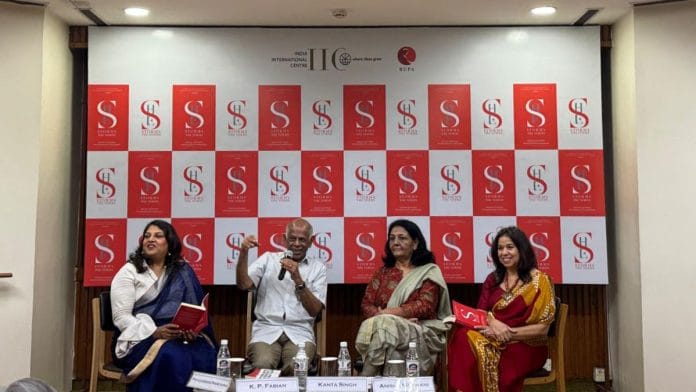Delhi: A book launch opening with a traditional classical dance is unusual, especially when the subject matter is not about the performing arts. But for authors Anisha Motwani and Priyadarshini Narendra, the Bharatanatyam performance that celebrated Shakti was the perfect way to introduce their book, She Storms the Norms.
Guests at New Delhi’s India International Centre (IIC) ooh-ed and aah-ed and whipped out their phones to record the 10-minute performance by the two women artistes from Kalakriti Arts in Delhi.
“There are many books written about women and successful women. Everybody wants to read about them. But in many ways, this book is a little bit of an antidote to that,” said Motwani, founder-director of Storm the Norm Ventures, a digital and brand advising consultancy.
In the book, the authors focus on women entrepreneurs and leaders across sectors, looking that the career trajectories of actor Nimrat Kaur, founder of Juggernaut Books Chiki Sarkar, celebrity hairstylist and the woman behind BBlunt Adhuna Bhabani, social worker and fashion designer Ruma Devi, para-athlete from Haryana Ekta Bhyan, to name a few. Each of these women overcame prejudice, patriarchy, and power games to ‘storm the norms’. Their stories are a reflection of the systemic, structural, and societal struggles faced by women.
“Had there been no patriarchy, progress would have been faster,” said KP Fabian, former diplomat, who moderated the panel discussion. Also part of the panel was Kanta Singh of UN Women India, discussing how women have realised their potential and changed their realities but still have to face biases on their path to success.
“Through this book, we learn that storms can be destructive, beautiful, and synergistic,” Fabian added.
Also Read: Personal is Political—Ex-IAS officer Aruna Roy wants to provoke conversations with her memoir
How it all starts
It all begins with gender stereotypes. To make her point, Narendra read out a paragraph from the book about a popular joke she heard as a child about a doctor and a nurse. The doctor and the nurse were stranded on a deserted island. Nine months later, they had a baby. But the doctor was not the father of the baby and the nurse was not the mother.
“Then how did this happen?” she asked rhetorically. “The doctor was the mother and the nurse was the father.” She then questioned why the audience was stunned and couldn’t immediately answer. “It still took us several minutes to work out this possibility,” said Narendra.
Drawing from personal experience in the professional space, Singh spoke about three indicators that impede the social growth of women: Society, infrastructure, and workplace policies.
Singh then talked about how a woman is isolated if she raises a sexual harassment complaint against her boss. “Even fellow women blame her because the accused is powerful. She is isolated and then we see other women leaving the office. But if the same thing happens with a man, he doesn’t face such repercussions,” said Singh.
The conversation moved to biases women face at home and how they are still raised with expectations of landing a good husband and not a lucrative career.
“We should not raise our daughters for marriage but should raise them in the same way as we raise our sons for their careers,” said Singh, who hails from Haryana.
Also Read: Incisive satire, diverse creatives—Cartoonist Abu Abraham held up a mirror to politicians
Women who inspire
Audience members, both men and women, were eager to share their experiences. As the question-and-answer round began, Narendra’s daughter, who was sitting in the audience, took the mic to congratulate her mother.
“One of the authors here is my mom and I want to say that she has always supported me,” she said, her voice drowned by the incessant clapping.
One gentleman spoke about the resilience of his housekeeper who ensured that her children went to college and spoke English. “Her story has inspired my family,” he said.
Another one spoke about the struggles women have to overcome to rise above ranks. Singh responded with an anecdote, saying that while she was growing up in rural Haryana, there was only one woman leader she could think of.
“It was Indira Gandhi. Now, we have many women leaders. But even symbolism was important. Even if you are just one, it makes things look simple in the sense that women can do these things.”
And then Singh segued into how men need to change their traditional, patriarchal ways.
“Men need to realise that the world is changing. They need to step up and change their attitudes now,” said Kanta as the discussion drew to a close.
(Edited by Humra Laeeq)






